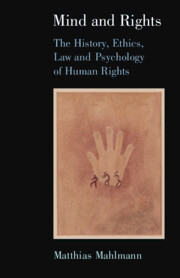‘Jurists, philosophers, historians, and (more recently) behavioral researchers have extensively studied the concept of human rights. In his thought-provoking book, Matthias Mahlmann masterfully draws all the threads together in order to gain a deeper understanding of the pertinent debates. This book offers a fresh, fascinating, and insightful analysis of this vital topic.’
Eyal Zamir - Hebrew University of Jerusalem
‘The term, magisterial, is often used promiscuously to characterize a book, but not in this case. It is deserved because it is a successful blend of immense interdisciplinary erudition applied to a vitally important topic. Fueled by passion for human rights, Minds and Rights is beautifully written and deep, requiring the reader’s attention and engagement. It is worth it.’
Stephen J. Morse - University of Pennsylvania School of Law
‘This book reaches the summit of the ambitions and promises of the title. Relying on state-of-the-art cognitive science and combining it with anthropology and moral philosophy it provides a compelling defense of human rights in a world of fashionable human rights skepticism.’
András Sajó - Central European University, former Vice-President of the European Court of Human Rights
‘Mahlmann offers us a passionately argued, deeply humane manifesto in support of human rights at a time when we need it most. It deserves a wide readership across the disciplines and should become one of the most influential books on the theory of human rights.’
Christopher McCrudden - Queen’s University, Belfast; University of Michigan Law School
‘Mind and Rights is a spectacular contribution to our understanding of ethics, cognitive science, and human rights. Mahlmann’s deep, systematic, and wide-ranging account takes issue with many influential trends in the study of mind, brain, and behavior, while also reviving and strengthening the case for universal human rights. A remarkably ambitious and provocative synthesis, which will shape and guide future reflection on these important topics.’
John Mikhail - Georgetown University Law Center



